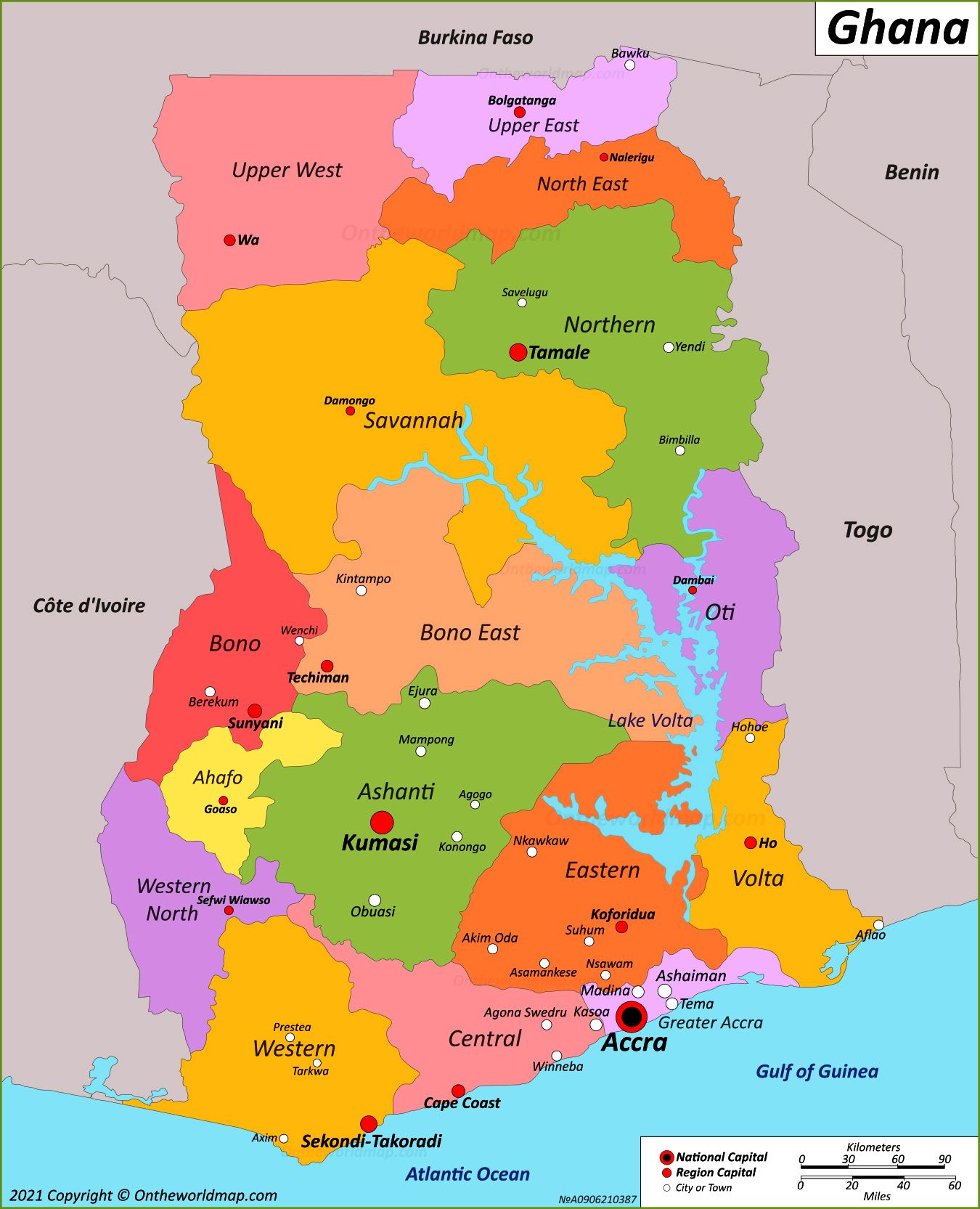
Image Source : https://ontheworldmap.com/ghana/
The Republic of Ghana is a country in West Africa along the Gulf of Guinea, just a few degrees north of the equator.
Ghana means "Warrior King", and lies in the centre of the West African coast, shares 2093 km of land borders with the three French-speaking nations of Burkina Faso (548 km) to the north, Ivory Coast (668 km) to the west, and Togo (877 km) to the east. To the south are the Gulf of Guinea and the Atlantic Ocean.
With a total area of 238,533 square km, Ghana is about the size of the United Kingdom. Its southernmost coast at Cape Three Points is 4° 30’ north of the equator. From here, the country extends inland for some 670 km to about 11° north. The distance across the widest part, between longitude 1°12’ east and longitude 3°15’ west, measures about 560 km. The Greenwich Meridian, which passes through London, also traverses the eastern of Ghana at Tema.
Beyond being economic partners and sharing mutual respect, Ghana and Latvia have a special bond. In 2018, Ghana and Latvia agreed to strengthen their bilateral relations and share best practices for the mutual benefit of both countries.
Ghana’s partnership with Latvia focuses on areas such as Agriculture, Information and Communication Technology (ICT), Education, Housing, Health and E-Governance, with efforts made to discuss investment opportunities in a number of these fields to promote growth and development for both countries.
In terms of economic relations, Latvia imports items such as organic chemicals, cocoa, paper, dairy products, eggs, honey, edible vegetables, soaps, lubricants, waxes, candles, plastics, and so on from Ghana, while Ghana imports fertilizers, beverages, vinegar, spirit, sports requisites, games, and toys from Latvia.
The Latvian Ministry of Foreign Affairs also has areas of interest in the Baltics EU-Africa partnership agenda. The Baltic countries (Estonia, Latvia, Lithuania) officially launched the Trialogue project on 19th February, 2022 together with policy makers from the Ministries of Foreign Affairs of the three Baltic countries, representatives of European institutions and other stakeholders in the Baltic and African countries (including Ghana).
Furthermore, a number of Ghanaian students are enrolled in higher education institutions in Latvia, to study medicine, engineering, and civil aviation, among others. Students play an important role in connecting countries, and it is an important aspect of our relations in this regard.
Investment opportunities are available for companies/factories to produce horticultural products for the local and international markets, especially to European markets. The EU is the main destination for Ghanaian horticultural exports. On the local markets the main horticultural products are yams, plantains, cassava, coco-yam/leaves, beans, groundnuts, tomatoes, chillies and onions.
Investment opportunities are available for companies to:
Produce horticultural seeds
Provide sustainable irrigation services in the industry
Organize small-holders into out-grower systems for production
Supply fertilizers, pesticides and other agricultural chemicals
Investment opportunities are available for companies to:
Provide packaging materials.
Buy the horticultural products for exports.
Supply and install cold chain equipment.
Organize small-holder firms into out-grower systems for marketing.
Provide post production services (transport, cold vans) Joint ventures
Package and ship floral products to international markets
Investment opportunities are available for companies to provide:
Technological and consulting services
Financial services and products to the industry
Research and development services
Inspection and grading according to international standards to make the deliveries acceptable in international markets
Capacity building on standards, training and certification
Stable, multi-party government
Demonstrated commitment to market liberalization
Ongoing privatizations in key economic sectors.
Expanding stock market.
Competitive labor force
Ongoing infrastructure development